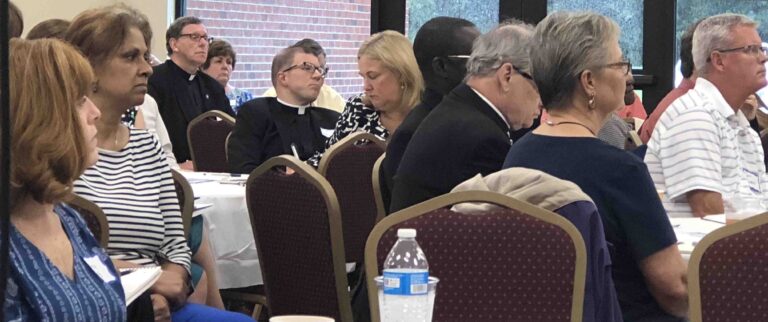If you are reading this, then you especially have suffered these past several weeks as a result of past failures on the part of Catholic bishops. Because if you’re reading this, you are most likely invested in the Church, going to Mass, supporting your parish, evangelizing those around you and now, once again, having to answer the question from friends and perhaps even family members, “Why are you still Catholic?” You’re having to explain why you belong to the Church of McCarrick, the Church investigated by the Pennsylvania grand jury, a Church that doesn’t practice what it preaches.
A woman from Anne Arundel County shared with me and my brother bishops at a recent listening session that she is having to answer these very questions from her grown daughters. She is a former employee of a number of Catholic institutions, so has even greater investment and “buy-in.” Yet she is struggling to convince her own Catholic-raised daughters why they should remain practicing Catholics.
Another woman at the same session shared the universal empathy we feel for victims of abuse but lamented that the Church doesn’t sufficiently recognize the impact of child sexual abuse on the survivor’s family. The vast majority of child sexual abuse victims wait until they are adults to share their horrific stories. For many, when they finally do open up, it results in a range of emotions and responses among all involved, including the resentment and blame of parents who unwittingly “failed to protect their child” from their abuser and the sad and belated realization of the reason why a child “was the way he was.” I am so grateful that person reminded all of us in that room just how much damage sexual abuse can do not just to the individual, but to entire families. It ruins lives and forever changes others.
Seeing how bishops handled abuse allegations in past decades, as horribly and necessarily depicted in the Pennsylvania report, has undoubtedly reopened wounds of disgust and distrust. And for those too young to remember 2002, it has opened innocent eyes to the Church’s sinful and, yes, criminal past. We remind people of the incredible work we’ve done in the ensuing 16 years to rid our Church of abuse and of those who would harm children, as well as their protectors. We tell them our efforts have made our Church distinctively inhospitable to anyone who would think about seeking refuge (as, sadly, many once did) to commit their heinous crimes without fear of consequence. But in the end, we can’t undo the past, we can’t go back and prevent the abuse, stop the cover-ups and protect the innocent. And we certainly and regrettably cannot undo the pain felt everyday by the innocent victims.
We have a crisis of trust. I’ve heard it in every one of my recent 20-plus gatherings with parishioners, clergy, seminarians, parents and students. People don’t trust the institutional Church. They don’t trust bishops. They don’t trust “Church people” to fix this. They want transparency and accountability. They don’t understand why the past hasn’t been fully owned-up to by now. They don’t understand why Church leaders “still don’t get it.” And they rightly demand to play a more active role in the life of the Church, not only pastorally, but also administratively.
I agree. On all counts.
We bishops have had 16 years to own up to our failures, for our sins of commission and omission. I thank God the Archdiocese of Baltimore took the painful and necessary step in 2002 of revealing the scope and impact of clergy sex abuse in its past. And we’ve kept the promise made 16 years ago by continuing the practice of transparency and accountability in the ensuing years, painful as it has been. We pray others will do the same, that they will be forthcoming with God’s people and that they won’t turn a blind eye to obvious signs of deceit and hypocrisy. Such clericalism has no place in the Church, just as there can be no place in the Church for anyone who would harm another. There can be no place in the Church for any prelate who fails to enforce the clear and strong policies that seek to ensure the safety and holiness of our Church.
I’ve heard much these past weeks and will continue to listen with my ears, my mind and my heart. I will report back to you what I’ve heard and how these heartfelt comments, no matter how hard they are to hear at times, will help to shape necessary reforms in our local Church and how they will inform my own contributions to the urgent conversations that are happening at higher levels of our Church.


